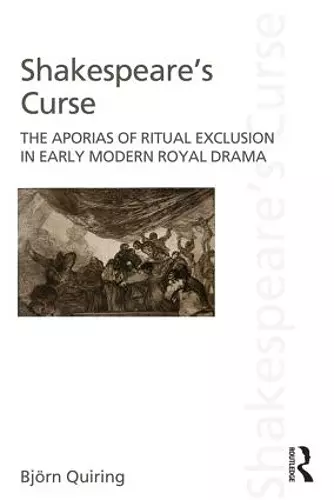Shakespeare's Curse
The Aporias of Ritual Exclusion in Early Modern Royal Drama
Format:Hardback
Publisher:Taylor & Francis Ltd
Published:30th Oct '13
Currently unavailable, and unfortunately no date known when it will be back

Conceptualizing the curse as the representation of a foundational, mythical violence that is embedded within juridical discourse, Shakespeare’s Curse:The Aporias of Ritual Exclusion in Early Modern Royal Drama pursues a reading of Richard III, King John, and King Lear in order to analyse the persistence of imprecations in the discourses of modernity. Shakespeare wrote during a period that was transformative in the development of juridical thinking. However, taking up the relationship between theater, theology and law, Björn Quiring argues that the curse was not eliminated from legal discourses during this modernization of jurisprudence; rather, it persisted and to this day continues to haunt numerous speech acts. Drawing on the work of Derrida, Lacan, Walter Benjamin and Giorgio Agamben, among others, Quiring analyses the performativity of the curse, and tracks its power through the juristic themes that are pursued within Shakespeare’s plays – such as sovereignty, legitimacy, succession, obligation, exception, and natural law. Thus, this book provides an original and important insight into early modern legal developments, as well as a fresh perspective on some of Shakespeare’s best known works.
A fascinating interdisciplinary study, this book will interest students and scholars of Law, Literature, and History.
"Shakespeare’s Curse is a compelling and original study of the terrible force of words in King Lear and the history plays. Written by one of Germany’s most brilliant young Shakespeare scholars, this book demonstrates the dramatic yoking of affect and order, act and expression, and sovereignty and ban within the primitive arc of the curse. Quiring combines deep juridical, philosophical and biblical knowledge with a compassionate and generous attention to the pathos of power in Shakespearean drama." - Julia Reinhard Lupton, author of Thinking with Shakespeare: Essays on Politics and Life
"A damn good book." - Roger Lüdeke, Shakespeare Jahrbuch
"Björn Quiring's study 'Shakspeare's Curse' is quite remarkable. With notable thoroughness, it explains the presence and history of cursing as an act of violence within the making of legal codes and lawmaking moments." - Nigel Smith, Princeton University
"Shakespeare’s Curse is well-written and delivers an exciting argument that makes possible a wide range of subsequent studies." - Matthew Vadnais for Theatre Journal (Vol. 67, No. 1, Mar 2015)
"Shakespeare’s Curse is a compelling and original study of the terrible force of words in King Lear and the history plays. Written by one of Germany’s most brilliant young Shakespeare scholars, this book demonstrates the dramatic yoking of affect and order, act and expression, and sovereignty and ban within the primitive arc of the curse. Quiring combines deep juridical, philosophical and biblical knowledge with a compassionate and generous attention to the pathos of power in Shakespearean drama."
Julia Reinhard Lupton, author of Thinking with Shakespeare: Essays on Politics and Life
"A damn good book."
Roger Lüdeke, Shakespeare Jahrbuch
"Björn Quiring's study 'Shakspeare's Curse' is quite remarkable. With notable thoroughness, it explains the presence and history of cursing as an act of violence within the making of legal codes and lawmaking moments.
In Shakespeare's history plays, and that of the best of his contemporaries, that act of verbal violence remains at work, but divorced from its original sites of operation. The curse in drama becomes a uniquely powerful, disarming force, crucial in the formation of the modern subject. Shakespeare's understanding of the meaning of the curse sets him apart and makes his plays an unusually highly attuned witness to the continuing role of the curse, even as secularization took hold. This study is compelling and exciting, and as high-powered and original a reading of Shakespeare as you could hope to find. It is wholly deserved and a great relief to have this study now translated into English."
Nigel Smith, Princeton University
ISBN: 9780415517560
Dimensions: unknown
Weight: 600g
280 pages